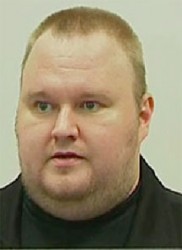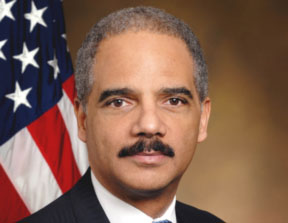WASHINGTON/WELLINGTON (Reuters) – A trip to New Zealand will put America’s chief prosecutor on the same soil as a flashy internet mogul who is fighting extradition to the United States on charges he assisted massive piracy of copyrighted movies and music.
US Attorney General Eric Holder visits New Zealand next week for an annual meeting of a “quintet” of attorneys general from mostly English-speaking countries – and not to meet up with the entrepreneur Kim Dotcom.
The founder of defunct file-sharing service Megaupload, Dotcom has oscillated between assailing Holder’s trip and wanting to hear what he has to say in person.
It was unclear yesterday whether Holder would appear in public. His speech at the University of Auckland is planned primarily for students and will be closed to the public and the media, although his US speeches are usually open to the media.


In Twitter posts, Dotcom requested a ticket to the speech, offered to send T-shirts and an ethics manual to wherever Holder is staying and challenged his followers to film Holder while a Megaupload theme song plays for a $500 prize.
Dotcom tweeted that he would like to understand Holder’s definition of cybercrime, one issue the quintet works on.
An extradition hearing for Dotcom is scheduled for August, although appeals could further delay it, said Ira Rothken, a lawyer for Megaupload. He told Reuters by phone he had no reason to expect a meeting between Holder and Dotcom.
Holder declined an interview through a spokeswoman on Thursday. Federal prosecutors in Virginia who are handling the case declined to comment on how it is proceeding.
Dotcom got rich from founding Megaupload, which allowed users to upload and download movies, music, television shows, e-books and software. The site once commanded 4 percent of global online traffic before US prosecutors shut it down.
The United States began a criminal copyright case against Dotcom in January 2012. At Washington’s request, New Zealand law enforcement officers conducted a dramatic raid on his mansion outside Auckland.
Attempts to have him sent to the United States for trial were delayed after a New Zealand court last year found that New Zealand used unlawful warrants in his arrest and illegally spied on him in the lead-up to the raid.
Dotcom and six associates face US charges that they conspired to infringe copyrights, launder money and commit racketeering and fraud.
The copyright case could set a precedent for internet liability laws and, depending on its outcome, may force entertainment companies to rethink their distribution methods.
Dotcom maintains that Megaupload, which housed everything from family photos to Hollywood blockbusters, was merely a storage facility for online files, and should not be held accountable if content stored on the site was obtained illegally.
The Justice Department counters that Megaupload encouraged piracy by paying money to users who uploaded popular content and by deleting content that was not regularly downloaded.
It said Megaupload cost copyright holders such as movie studios and record companies more than $500 million and generated more than $175 million in criminal proceeds. It called the case among the largest ever involving criminal copyright.
Dotcom launched a new file-sharing service, Mega, in January.
Many New Zealanders view Dotcom, born in Germany as Kim Schmitz, as a folk hero fighting for online freedom and willing to stand up to the US and New Zealand governments.
Dotcom, who has been released on bail and is suing the New Zealand government for illegal surveillance, predicted Holder would keep a low profile during his visit.
“It’s probably risk management and avoidance of bad PR because the story has not yet arrived in any big way in the US media,” he wrote in an email to Reuters. “Any bad coverage here might spill over to the US.”
Holder’s visit to Dotcom’s country of residence is not his choice. The attorneys general of Australia, Canada, New Zealand, the United Kingdom and the United States began meeting as a quintet in 2009 to discuss legal matters including cybercrime.
After a gathering in Ottawa last year, it was New Zealand’s turn to host.




